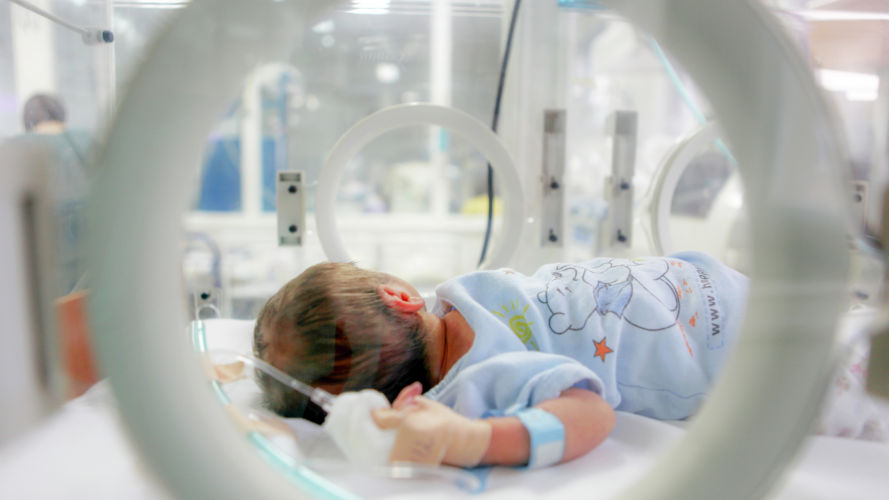CoSW assistant professor Aubrey Jones works with a team of UK researchers committed to understanding challenges and improving provisions for family-centered care. You can access their published work here.
Lexington, KY (August 8, 2024) – The stress of having an infant in the Neonatal Intensive Care Unit (NICU) can disrupt parent well-being, the transition to parenthood, and typical trajectories of infant and child health. For lesbian, gay, bisexual, transgender, queer, or other sexual and gender minority identity (LGBTQ+) parents, this stress may be compounded by health disparities and fear of stigma and discrimination.
Enter Dr. Aubrey Jones and her team.
Dr. Jones, an assistant professor at the University of Kentucky College of Social Work (CoSW), is leading a dedicated team of researchers in exploring and expanding the understanding of the experiences of LGBTQ+ parents with infants in the NICU. Their work aims to develop comprehensive care strategies to better support these families.
Their research, published in Children (MDPI), focuses on understanding the challenges of stigma and discrimination, identifying sources of strength and resilience, and improving the provision of family-centered care.
The team was comprised of researchers across a variety of disciplines:
– Aubrey Jones: College of Social Work
– Olivia Swedberg Yinger: School of Music, College of Fine Arts
– Keisa Fallin-Bennett: Department of Family and Community Medicine, College of Medicine
– Chelsea Gibbs: School of Music, College of Fine Arts
– Rachel H. Farr: Department of Psychology, College of Arts and Sciences
Background
In the United States, approximately 5.5% of adults identify as LGBTQ+ (Flores & Conron, 2023). Of the 13.9 million LGBTQ+ adults, an estimated 29% are rearing children under 18 years of age (Williams Institute, 2019). LGBTQ+ parents may be more likely to have infants admitted to the NICU due to their diverse pathways to parenthood, including adoption, surrogacy, and assisted reproductive technology (ART), which are associated with higher NICU admission rates (Patterson, Farr, & Goldberg, 2021). This review examines the challenges faced by LGBTQ+ parents in the NICU, the contributing authors and their accolades, and the proposed solutions to improve care for these families.
Challenges Faced by LGBTQ+ Parents in the NICU
The integrative review identified several challenges faced by LGBTQ+ parents in the NICU:
1. Stigma and Discrimination: LGBTQ+ parents often face stigma and discrimination, which can manifest in being denied access to their infants, not being recognized as legitimate parents, and facing heteronormative assumptions from staff (Sigurdson et al., 2020).
2. Health Disparities: LGBTQ+ parents experience higher rates of health disparities compared to their cisgender and heterosexual counterparts, leading to increased stress and mental health challenges during the NICU experience (Medina-Martínez et al., 2021).
3. Legal and Financial Barriers: Legal recognition of parental rights remains a challenge for many LGBTQ+ parents, particularly non-birthing parents. Financial strain is also a significant issue, especially regarding the cost of NICU stays and legal processes like second-parent adoption (Hudak, 2023).
“Our research aims to shed light on the disparities that queer families face in NICUs and to advocate for changes that will make these critical care environments more inclusive and supportive,” said Jones. “Every family, regardless of their structure, deserves the highest standard of care, and our work is a step towards achieving that goal.”
Proposed Solutions
The integrative review suggests several solutions to improve care for LGBTQ+ parents in the NICU:
1. Family-Centered Care (FCC): Emphasizing FCC can improve the NICU experience for LGBTQ+ parents. FCC principles include dignity and respect, information sharing, family participation in care, and family collaboration (Franck & O’Brien, 2019). Successful FCC involves inclusive practices such as acknowledging both parents, involving them in care decisions, and respecting their roles.
2. Training and Policy Changes: Hospitals and NICUs need to implement training programs for staff that focus on inclusive care for LGBTQ+ families. This includes using appropriate language, recognizing diverse family structures, and avoiding assumptions based on heteronormativity (Jackson et al., 2022).
3. Support and Resilience: LGBTQ+ parents often draw strength from chosen family, community belonging, and affirming environments. Recognizing and supporting these sources of resilience can help improve their NICU experience (Gooding & Yinger, 2023).
4. Further Research: More rigorous and inclusive research on the experiences of LGBTQ+ parents in the NICU is needed, focusing on both challenges and sources of strength. Future studies should involve community-engaged methods to ensure the perspectives of LGBTQ+ parents are centered and respected (Gómez-Cantarino et al., 2020).
Conclusion
This integrative review highlights the unique challenges and experiences of LGBTQ+ parents in the NICU and underscores the need for inclusive and supportive care practices. Implementing the proposed solutions can improve the NICU experience for LGBTQ+ families, promoting health equity and well-being.
“Every family deserves the highest standard of care, and our work is a step towards achieving that goal,” Dr. Jones said.
The University of Kentucky College of Social Work remains committed to advancing research that promotes social justice and equity in healthcare, paving the way for more inclusive practices that benefit all families.
You can read the original integrative review in Children by clicking here.






